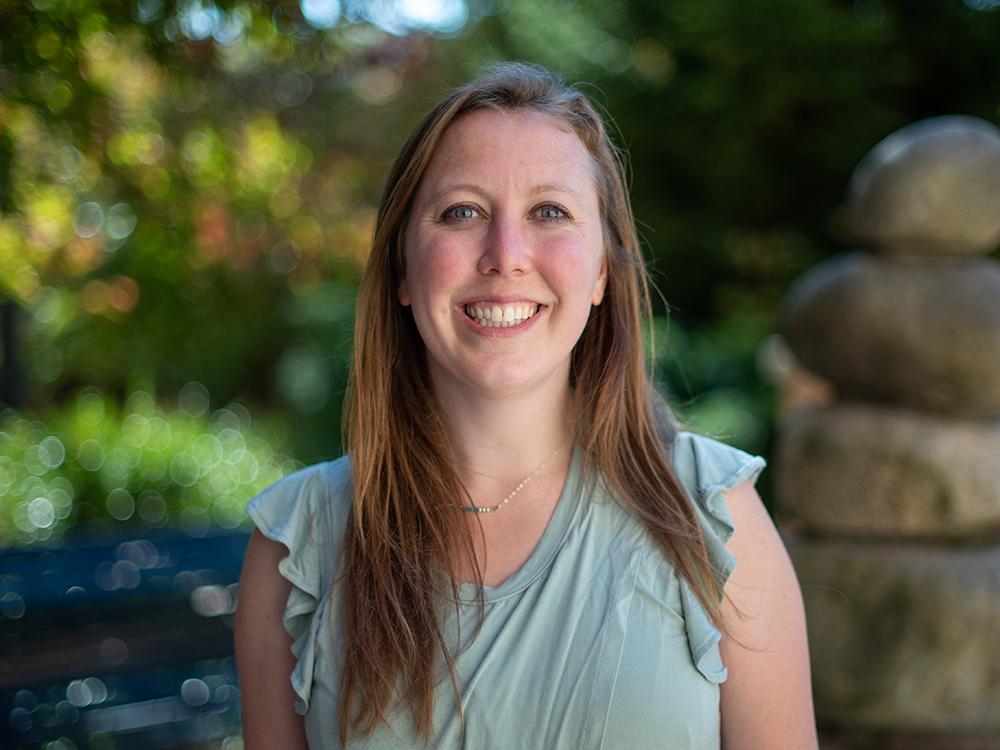
Melissa Gervais, assistant professor of meteorology and atmospheric science in the College of Earth and Mineral Sciences. Credit: Penn State. Creative Commons
Impact of sea ice loss on weather, cold air outbreaks focus of NSF CAREER Award
Posted on April 27, 2023UNIVERSITY PARK, Pa. — Melissa Gervais, assistant professor of meteorology and atmospheric science, received a five-year $874,000 Faculty Early Career Development (CAREER) award from the National Science Foundation to investigate the impact of sea ice loss on large-scale patterns of atmospheric variability and cold air outbreaks.
“Arctic sea ice plays a critical role in the climate system, acting to reflect incoming solar radiation and limit heat and moisture flux from the ocean to the atmosphere,” said Gervais. “It’s loss due to human-caused climate change can have a profound impact on the atmosphere. The goal of this project is to further our understanding of how future Arctic sea ice loss might impact daily weather patterns and extreme cold air outbreak events.”
Society is particularly interested in the impacts of climate change, including sea ice loss, on weather and extreme events that can have large socio-economic effects.
“Extreme cold air outbreaks, such as the 2021 ‘Valentine’s Week Winter Outbreak’ that severely impacted the Texas power grid, can have significant socio-economic impacts,” said Gervais. “Understanding how and why these events may change in the future can provide governments and industry with the information necessary to adapt to these changes.”
Arctic sea ice has experienced a significant decline, causing significant impacts on the atmosphere. With greater sea ice loss expected in the future, several studies have shown a robust impact on atmospheric variability and extreme cold air outbreaks. However, the statistical metrics typically used to identify these changes are limited in their ability to probe more deeply into the mechanisms responsible, according to Gervais.
“We have a good understanding that Arctic sea ice loss is causing Arctic amplification, where the Arctic is warming faster and greater than the mid latitudes,” said Gervais. “But we need to know how the actual daily variability will be modified and how will it impact cold air outbreaks.”
Gervais’ research will take a novel approach to this problem using self-organizing maps, a machine learning method, to characterize large-scale patterns of atmospheric variability; and a feature-tracking algorithm, TempestExtremes, to identify and track cold air outbreaks throughout their entire evolution.
“We can look at the lifecycle of a cold outbreak — where it starts, where it ends, how it moves in between, and at all the different processes responsible — in the observations,” said Gervais. “This research will also be looking utilize a large suite of climate model simulations to try to figure out how well these types of events are represented and how they may change in the future.”
Gervais said she also hopes to enhance public understanding and engagement on climate change issues. She plans to train broadcast meteorologists to be ambassadors for the communication of climate change in collaboration with the weather communications group in the Department of Meteorology and Atmospheric Science, to train climate science students in the Climate Science Dual-Title program to effectively communicate their expertise to the public and to engage and educate the public on climate change issues. This outreach to the public will utilize “Weather World,” the Penn State Department of Meteorology and Atmospheric Science’s weekday, 15-minute weather broadcast.
“Effective climate communication is needed to improve public understanding, engagement and ultimately action on climate change,” said Gervais. “Training broadcast meteorologists and giving them the tools they need to be the frontline communicators about climate change is vital. They are the people who are spending time in the communities, they are trusted by their local communities, they are best positioned to help people understand the threat and what they need to do.”
Gervais is a co-hire in Penn State’s Institute for Computational and Data Sciences and an adjunct associate research scientist with the Lamont Doherty Earth Institute. Prior to joining Penn State in 2018, she worked as a postdoctoral research scientist at Columbia University. She earned her bachelor’s and master’s degrees in physics from the University of Toronto and her doctorate in atmospheric and oceanic sciences from McGill University.
The National Science Foundation’s Faculty CAREER Program recognizes the potential of early-career faculty to serve as academic role models in research and education.
